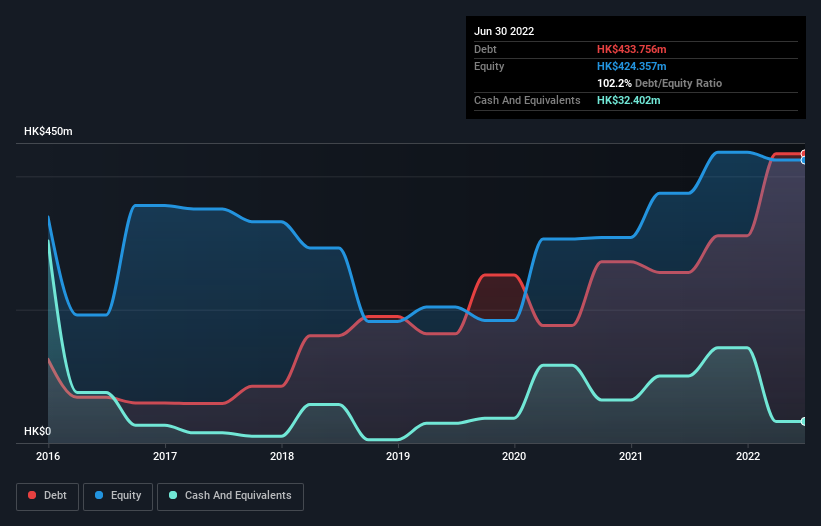China Finance Investment Holdings (HKG:875) Takes On Some Risk With Its Use Of Debt

Legendary fund manager Li Lu (who Charlie Munger backed) once said, 'The biggest investment risk is not the volatility of prices, but whether you will suffer a permanent loss of capital.' So it might be obvious that you need to consider debt, when you think about how risky any given stock is, because too much debt can sink a company. As with many other companies China Finance Investment Holdings Limited (HKG:875) makes use of debt. But should shareholders be worried about its use of debt?
What Risk Does Debt Bring?
Debt is a tool to help businesses grow, but if a business is incapable of paying off its lenders, then it exists at their mercy. If things get really bad, the lenders can take control of the business. While that is not too common, we often do see indebted companies permanently diluting shareholders because lenders force them to raise capital at a distressed price. Having said that, the most common situation is where a company manages its debt reasonably well - and to its own advantage. The first thing to do when considering how much debt a business uses is to look at its cash and debt together.
Our analysis indicates that 875 is potentially overvalued!
What Is China Finance Investment Holdings's Net Debt?
You can click the graphic below for the historical numbers, but it shows that as of June 2022 China Finance Investment Holdings had HK$433.8m of debt, an increase on HK$255.8m, over one year. However, it also had HK$32.4m in cash, and so its net debt is HK$401.4m.

How Healthy Is China Finance Investment Holdings' Balance Sheet?
According to the last reported balance sheet, China Finance Investment Holdings had liabilities of HK$868.6m due within 12 months, and liabilities of HK$25.5m due beyond 12 months. Offsetting this, it had HK$32.4m in cash and HK$952.1m in receivables that were due within 12 months. So it actually has HK$90.3m more liquid assets than total liabilities.
This surplus suggests that China Finance Investment Holdings has a conservative balance sheet, and could probably eliminate its debt without much difficulty.
In order to size up a company's debt relative to its earnings, we calculate its net debt divided by its earnings before interest, tax, depreciation, and amortization (EBITDA) and its earnings before interest and tax (EBIT) divided by its interest expense (its interest cover). Thus we consider debt relative to earnings both with and without depreciation and amortization expenses.
With a net debt to EBITDA ratio of 20.5, it's fair to say China Finance Investment Holdings does have a significant amount of debt. But the good news is that it boasts fairly comforting interest cover of 6.0 times, suggesting it can responsibly service its obligations. We also note that China Finance Investment Holdings improved its EBIT from a last year's loss to a positive HK$12m. The balance sheet is clearly the area to focus on when you are analysing debt. But you can't view debt in total isolation; since China Finance Investment Holdings will need earnings to service that debt. So if you're keen to discover more about its earnings, it might be worth checking out this graph of its long term earnings trend.
Finally, a business needs free cash flow to pay off debt; accounting profits just don't cut it. So it's worth checking how much of the earnings before interest and tax (EBIT) is backed by free cash flow. Over the last year, China Finance Investment Holdings saw substantial negative free cash flow, in total. While investors are no doubt expecting a reversal of that situation in due course, it clearly does mean its use of debt is more risky.
Our View
Both China Finance Investment Holdings's conversion of EBIT to free cash flow and its net debt to EBITDA were discouraging. At least its level of total liabilities gives us reason to be optimistic. Taking the abovementioned factors together we do think China Finance Investment Holdings's debt poses some risks to the business. So while that leverage does boost returns on equity, we wouldn't really want to see it increase from here. The balance sheet is clearly the area to focus on when you are analysing debt. But ultimately, every company can contain risks that exist outside of the balance sheet. For instance, we've identified 3 warning signs for China Finance Investment Holdings (2 are significant) you should be aware of.
When all is said and done, sometimes its easier to focus on companies that don't even need debt. Readers can access a list of growth stocks with zero net debt 100% free, right now.
New: AI Stock Screener & Alerts
Our new AI Stock Screener scans the market every day to uncover opportunities.
• Dividend Powerhouses (3%+ Yield)
• Undervalued Small Caps with Insider Buying
• High growth Tech and AI Companies
Or build your own from over 50 metrics.
Have feedback on this article? Concerned about the content? Get in touch with us directly. Alternatively, email editorial-team (at) simplywallst.com.
This article by Simply Wall St is general in nature. We provide commentary based on historical data and analyst forecasts only using an unbiased methodology and our articles are not intended to be financial advice. It does not constitute a recommendation to buy or sell any stock, and does not take account of your objectives, or your financial situation. We aim to bring you long-term focused analysis driven by fundamental data. Note that our analysis may not factor in the latest price-sensitive company announcements or qualitative material. Simply Wall St has no position in any stocks mentioned.
About SEHK:875
Congyu Intelligent Agricultural Holdings
An investment holding company, engages in growing, processing, and trading of agricultural produce in the People’s Republic of China.
Excellent balance sheet low.
Market Insights
Community Narratives




